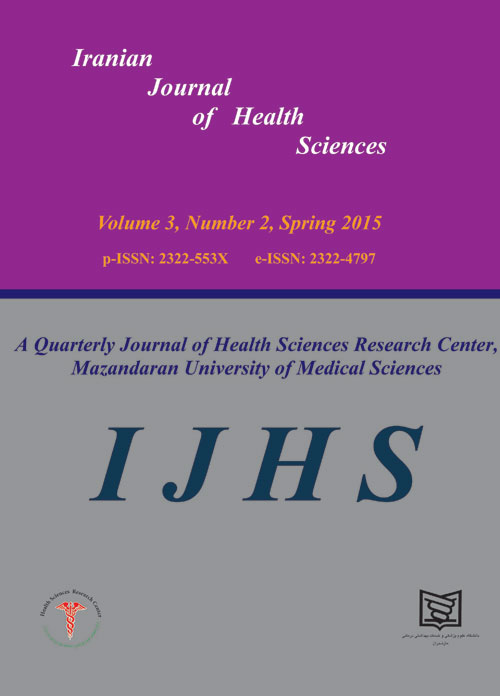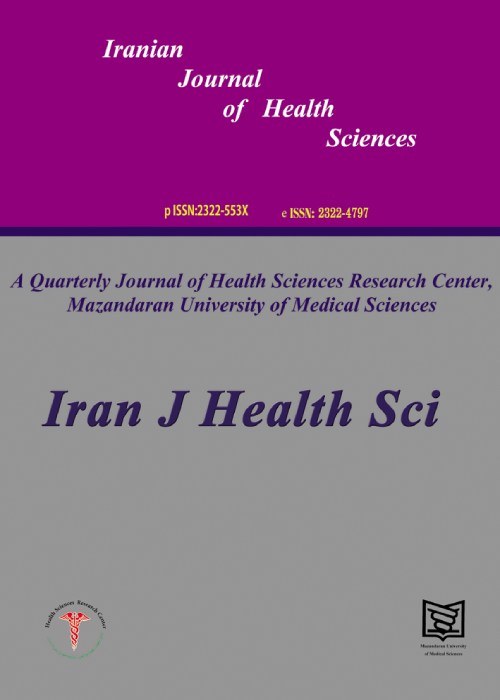فهرست مطالب

Iranian Journal of Health Sciences
Volume:5 Issue: 1, Winter 2017
- تاریخ انتشار: 1396/01/10
- تعداد عناوین: 6
-
-
Pages 1-12Background andPurposeReproductive and sexual health related problems constitute one third of health problems among women aged 15 to 44 years. Sexually transmitted infections are a significant challenge for human development. We aimed to assess the prevalence of STIs and identify factors associated with among Iranian women.Materials And MethodsThrough a cross-sectional study, 399 women aged 10-49 years were recruited. These were women who referred to urban and rural health centers in a city in Iran. Through a behavioral questionnaire, high-risk behaviors of the sample were asked about. Syndromic STIs were also assessed through clinical examination. T-test and multivariable Modified Poisson Regression was used to estimate the Prevalence Risk Ratios (PRRs) in Stata 13. P-values less than 0.05 were considered as statistically significant.ResultsAbout 64.2% of the participants had at least one of the STIs. STI prevalence was significantly higher among women who self-reported not using condoms in their last sexual contact (75% vs. 39.8%), whose spouse/sexual partners (SSP) had extramarital sex (87.7% vs. 59.6%), whose SSP had a past-year history of illicit substance use (72.9%vs. 60.9%), and whose SSP had a history of incarceration (91.5% vs. 59.1%). In multivariable analysis, it was shown that having first sexual intercourse before 20 years of age, history of abortion in the past year, low family income, not using condom in last sexual contact, and the partners incarceration history were identified as significant predictors.ConclusionsThe knowledge produced from the current research can serve as evidence for the promotion of interventions and healthcare services related to sexual and reproductive health for Iranian women and their SSPs. The findings from the current study also support research on improving strategies for STI diagnosis and STI management.Keywords: sexually transmitted infections, women, high-risk behaviors, Iran
-
Pages 13-25Background andPurposeWomen with low (high) pre-pregnancy body mass index (BMI) recently delivered infants with approximately normal or close to normal birth weights under the high quality of prenatal care. This study estimated the effect of pre-pregnancy BMI when concerns about the effects of different quality levels of prenatal care and the health status of mothers and their infants existed.Materials And MethodsThe sample consisted of the female patients who referred to one of the two hospitals with different quality levels of prenatal care in a city of Iran. The logistic mixed effect model and Chi-square test did not show any significant effect of low (high) BMI on the risk of low (high) birth weight. Then, the two-stage residual inclusion instrumental variable (IV) method was used to estimate the effect of BMI in order to overcome the effects of the levels of quality care and the health status of the mothers and their infants.ResultsAdjusted IV analysis revealed that women with a low BMI experienced an approximately 18% (RR=0.82; 95% CI (0.69, 0.97)) reduction in the risk of delivering a LBW infant and women with a high BMI experienced an approximately 26% (RR=0.74; 95% CI (0.57, 0.96)) reduction in the risk of delivering a HBW infant when they were under the care of a high quality hospital.ConclusionThis study revealed that the effect of BMI is confounded by the effects of quality of care and the health status of the mothers and their infants. Further, these results contributed to providing the conditions in improving the health status of mothers and their infants during pregnancy in local areas.Keywords: Body mass index, Instrumental variable, Quality of care, Low, high birth weights
-
Pages 26-37Background andPurposeDisasters and traffic accidents as the leading causes of disability and death throughout the world are the most significant health problems which have usually been predictable and, therefore, possible to prevent. The present study, as the first attempt, was conducted to calculate the burden of life years lost due to early death caused by traffic accidents in Mazandaran Province.Materials And MethodsThe current study was cross-sectional, and the data was collected from the center of Mazandaran Legal Medicine. The number of years of life lost due to premature death was calculated by using the instructions GBD2010 age and gender composition of the province was taken in the last census in 2012 from the Statistical Center. Then the SPSS Software was used to key in all the collected information in order to perform the analysis.ResultsOf the total population in 2015, 729 deaths were recorded due to car accidents with 77.9 percent of them being male. Mean age was 43.07±21.18 and 44.67±23.34 in women. The number of years of life lost due to premature death was 24972.7 years in men, 6965.3 years in women, and the total of two genders was 31938 years (10.6 years per thousand people) which were calculated, and it was the highest in the age group ranging from 20 to 24 years old.DiscussionAccording to the high rate of deaths from traffic accidents and damages resulted from it, and in order to reduce these losses, it is necessary to take appropriate preventive measures.Keywords: YLL, traffic accidents, mortality, Mazandaran
-
Pages 38-48Background andPurposeAlthough, economically, referral systems make utilization of health facilities at different levels sound, in many countries caretakers often bypass primary care facilities that are regularly costlier for caretakers and health care systems. The main objective of the current study was to assess the utilization of hospital services with more emphasis on economic point of view.Materials And MethodsThe present study was a facility-based cross-sectional study. A researcher developed questionnaire was used to collect the data. The samples were randomly selected and interviewed on their consent. SPSS Software was also used to analyze the collected data through Chi-2, correlation, and t-test.ResultsJust 29.4 percent of the attendees to the hospital were carrying out a referral slip from their family medicine. Five variables including type of care, type of attending, appointment arrangement, satisfaction with family medicine, and vising family medicine were statistically analyzed and found significantly related to carrying referral slip.ConclusionBecause of dysfunction of referral system, Irans health care system was found to be far from achieving economic advantages of a referral based DHS. It is actually an inappropriate use of limited health resources in a country like Iran that seriously suffers from shortage of financial and health system resources. This is likely due to deficiencies in the components of its referral system, therefore, a full revision of current reforms and appropriate remedies for deficiencies in the components of referral system was found to be in top priority in Iran.Keywords: Gatekeeping, referral, family practitioner, hospital
-
Prevalence of sleep disorder among medical students in an Eastern university in IranPages 49-54BackgroundSleep disorder is mostly an early manifestation of psychological diseases. It is defined as disturbances in the regularity, quality and quantity of sleep as well as daily activity.MethodsIn this cross-sectional study, 200 medical students were assessed for sleep status using SHQ and GHQ questionnaires. Data analysis was carried out using descriptive statistics (mean, standard deviation, frequency) and Chi square test through the statistical package of SPSS V.16.ResultsThe frequency of sleep disorder among students was found to be 21.5%., which was significantly more common among older students (pConclusionSleep disorders were higher among students who were men, smokers, or had psychological disorders, and were also employed students. Although a considerable group of medical students were found to be suffering from sleep disorders, this prevalence was lower than those reported in the previous studies.Keywords: Sleep disorder, Psychological disorder, Medical students, Prevalence
-
Pages 55-58Lead is a heavy metal that affects many organs such as nervous system, liver, and kidney. The most important affected organ is central nervous system. The present study reported a case similar to Amyotrophic lateral sclerosis (ALS) due to lead exposure in an opium addicted person. The patient complaint was the weakness of upper and lower limbs in addition to the unsteadiness of gait. Nerve conduction studies showed normal sensory and motor action potential but needle electromyography showed fasciculation in distal and proximal muscles. The patient was encephalopathic and had psychiatric disorder. The blood lead level was also found to be higher than the normal upper limit. Hence, lead poisoning could occur in a patient addicted to opium with symptoms similar to ALS.Keywords: Amyotrophic Lateral Sclerosis, Lead, Toxicity


